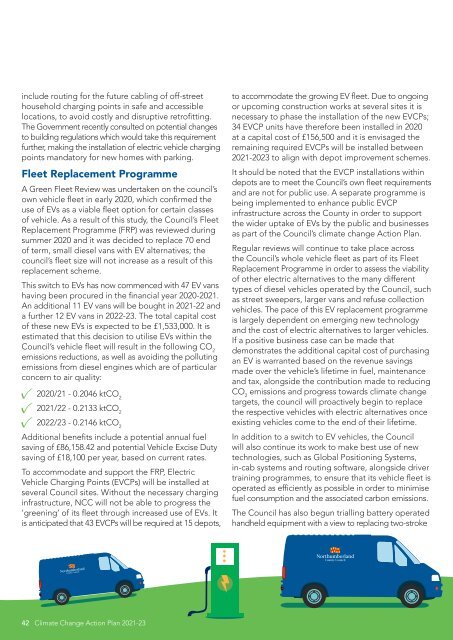Climate change action plan 2021-23
Climate change action plan 2021-23
Climate change action plan 2021-23
You also want an ePaper? Increase the reach of your titles
YUMPU automatically turns print PDFs into web optimized ePapers that Google loves.
include routing for the future cabling of off-street<br />
household charging points in safe and accessible<br />
locations, to avoid costly and disruptive retrofitting.<br />
The Government recently consulted on potential <strong>change</strong>s<br />
to building regulations which would take this requirement<br />
further, making the installation of electric vehicle charging<br />
points mandatory for new homes with parking.<br />
Fleet Replacement Programme<br />
A Green Fleet Review was undertaken on the council’s<br />
own vehicle fleet in early 2020, which confirmed the<br />
use of EVs as a viable fleet option for certain classes<br />
of vehicle. As a result of this study, the Council’s Fleet<br />
Replacement Programme (FRP) was reviewed during<br />
summer 2020 and it was decided to replace 70 end<br />
of term, small diesel vans with EV alternatives; the<br />
council’s fleet size will not increase as a result of this<br />
replacement scheme.<br />
This switch to EVs has now commenced with 47 EV vans<br />
having been procured in the financial year 2020-<strong>2021</strong>.<br />
An additional 11 EV vans will be bought in <strong>2021</strong>-22 and<br />
a further 12 EV vans in 2022-<strong>23</strong>. The total capital cost<br />
of these new EVs is expected to be £1,533,000. It is<br />
estimated that this decision to utilise EVs within the<br />
Council’s vehicle fleet will result in the following CO 2<br />
emissions reductions, as well as avoiding the polluting<br />
emissions from diesel engines which are of particular<br />
concern to air quality:<br />
2020/21 - 0.2046 ktCO 2<br />
<strong>2021</strong>/22 - 0.2133 ktCO 2<br />
2022/<strong>23</strong> - 0.2146 ktCO 2<br />
Additional benefits include a potential annual fuel<br />
saving of £86,158.42 and potential Vehicle Excise Duty<br />
saving of £18,100 per year, based on current rates.<br />
To accommodate and support the FRP, Electric<br />
Vehicle Charging Points (EVCPs) will be installed at<br />
several Council sites. Without the necessary charging<br />
infrastructure, NCC will not be able to progress the<br />
‘greening’ of its fleet through increased use of EVs. It<br />
is anticipated that 43 EVCPs will be required at 15 depots,<br />
to accommodate the growing EV fleet. Due to ongoing<br />
or upcoming construction works at several sites it is<br />
necessary to phase the installation of the new EVCPs;<br />
34 EVCP units have therefore been installed in 2020<br />
at a capital cost of £156,500 and it is envisaged the<br />
remaining required EVCPs will be installed between<br />
<strong>2021</strong>-20<strong>23</strong> to align with depot improvement schemes.<br />
It should be noted that the EVCP installations within<br />
depots are to meet the Council’s own fleet requirements<br />
and are not for public use. A separate programme is<br />
being implemented to enhance public EVCP<br />
infrastructure across the County in order to support<br />
the wider uptake of EVs by the public and businesses<br />
as part of the Council’s climate <strong>change</strong> Action Plan.<br />
Regular reviews will continue to take place across<br />
the Council’s whole vehicle fleet as part of its Fleet<br />
Replacement Programme in order to assess the viability<br />
of other electric alternatives to the many different<br />
types of diesel vehicles operated by the Council, such<br />
as street sweepers, larger vans and refuse collection<br />
vehicles. The pace of this EV replacement programme<br />
is largely dependent on emerging new technology<br />
and the cost of electric alternatives to larger vehicles.<br />
If a positive business case can be made that<br />
demonstrates the additional capital cost of purchasing<br />
an EV is warranted based on the revenue savings<br />
made over the vehicle’s lifetime in fuel, maintenance<br />
and tax, alongside the contribution made to reducing<br />
CO 2<br />
emissions and progress towards climate <strong>change</strong><br />
targets, the council will proactively begin to replace<br />
the respective vehicles with electric alternatives once<br />
existing vehicles come to the end of their lifetime.<br />
In addition to a switch to EV vehicles, the Council<br />
will also continue its work to make best use of new<br />
technologies, such as Global Positioning Systems,<br />
in-cab systems and routing software, alongside driver<br />
training programmes, to ensure that its vehicle fleet is<br />
operated as efficiently as possible in order to minimise<br />
fuel consumption and the associated carbon emissions.<br />
The Council has also begun trialling battery operated<br />
handheld equipment with a view to replacing two-stroke<br />
42<br />
<strong>Climate</strong> Change Action Plan <strong>2021</strong>-<strong>23</strong>
















